Hyundai Staria vs Maxus Mifa 9 - Differences and prices compared
Compare performance (225 HP vs 245 HP), boot space and price (42400 £ vs 59100 £ ) at a glance. Find out which car is the better choice for you – Hyundai Staria or Maxus Mifa 9?
Costs and Efficiency:
When it comes to price and running costs, the biggest differences usually appear. This is often where you see which car fits your budget better in the long run.
Hyundai Staria has a evident advantage in terms of price – it starts at 42400 £ , while the Maxus Mifa 9 costs 59100 £ . That’s a price difference of around 16706 £.
Engine and Performance:
Power, torque and acceleration are the classic benchmarks for car enthusiasts – and here, some clear differences start to show.
When it comes to engine power, the Maxus Mifa 9 has a slight edge – offering 245 HP compared to 225 HP. That’s roughly 20 HP more horsepower.
In acceleration from 0 to 100 km/h, the Maxus Mifa 9 is slightly quicker – completing the sprint in 8.90 s, while the Hyundai Staria takes 10.20 s. That’s about 1.30 s faster.
There’s also a difference in torque: Hyundai Staria pulls minimal stronger with 367 Nm compared to 350 Nm. That’s about 17 Nm difference.
Space and Everyday Use:
Whether family car or daily driver – which one offers more room, flexibility and comfort?
Seats: Hyundai Staria offers distinct more seating capacity – 9 vs 7.
In curb weight, Hyundai Staria is minimal lighter – 2275 kg compared to 2385 kg. The difference is around 110 kg.
In terms of boot space, the Hyundai Staria offers significantly more room – 831 L compared to 466 L. That’s a difference of about 365 L.
When it comes to payload, Hyundai Staria clearly perceptible takes the win – 775 kg compared to 615 kg. That’s a difference of about 160 kg.
Who wins the race?
The Hyundai Staria proves to be edges out slightly and therefore becomes our DriveDuel Champion!
Hyundai Staria is the better all-rounder in this comparison.
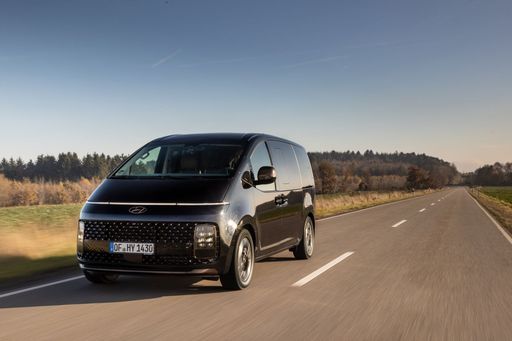
Hyundai Staria
Costs and Consumption
View detailed analysis
Engine and Performance
View detailed analysis
Dimensions and Body
View detailed analysis
Hyundai Staria
Hyundai Staria looks like a friendly spaceship, its sweeping glass and soft edges turning a people‑mover into a design statement that actually gets noticed. Inside it's airy and practical — perfect for families or anyone who likes travelling in comfort and style, with enough flexibility to swallow luggage and weekend plans without drama.
details
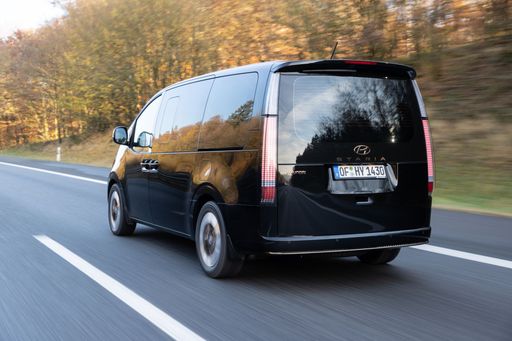
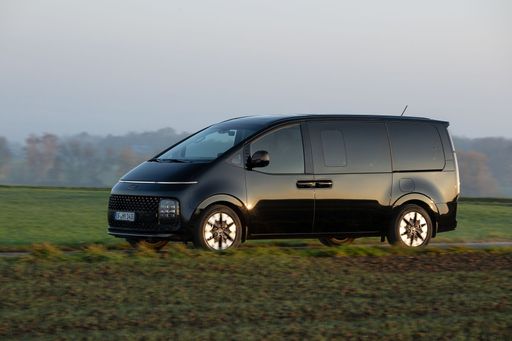
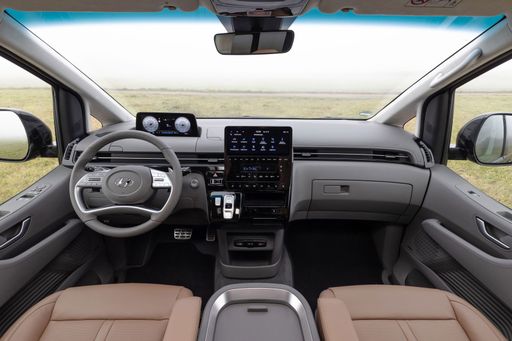
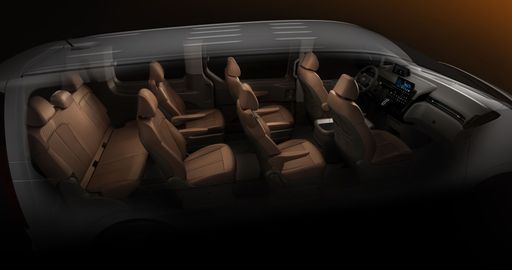
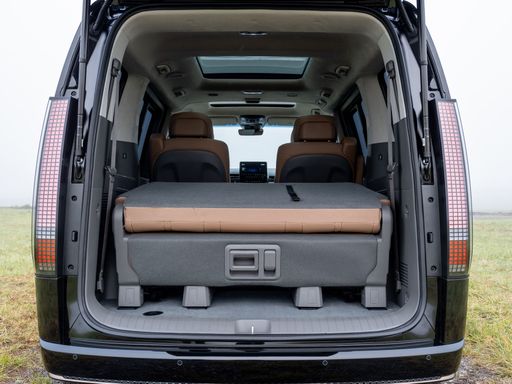
Maxus Mifa 9
The Maxus Mifa 9 arrives as a roomy, tech-laden electric MPV that quietly turns family hauling into a first-class commute. With an airy cabin, smart infotainment and a calm, refined ride, it’s an appealing choice for buyers who want practicality without sacrificing polish — and yes, it’s surprisingly pleasant to drive.
detailsCosts and Consumption |
|
|---|---|
|
Price
42400 - 50500 £
|
Price
59100 - 71100 £
|
|
Consumption L/100km
7.60 L
|
Consumption L/100km
-
|
|
Consumption kWh/100km
-
|
Consumption kWh/100km
21.3 - 21.8 kWh
|
|
Electric Range
-
|
Electric Range
430 - 440 km
|
|
Battery Capacity
-
|
Battery Capacity
-
|
|
co2
172 g/km
|
co2
0 g/km
|
|
Fuel tank capacity
-
|
Fuel tank capacity
-
|
Dimensions and Body |
|
|---|---|
|
Body Type
Bus
|
Body Type
MPV
|
|
Seats
7 - 9
|
Seats
7
|
|
Doors
-
|
Doors
5
|
|
Curb weight
2275 - 2345 kg
|
Curb weight
2385 - 2610 kg
|
|
Trunk capacity
117 - 831 L
|
Trunk capacity
466 L
|
|
Length
-
|
Length
5270 mm
|
|
Width
1997 mm
|
Width
2000 mm
|
|
Height
-
|
Height
1840 mm
|
|
Max trunk capacity
-
|
Max trunk capacity
2017 L
|
|
Payload
605 - 775 kg
|
Payload
485 - 615 kg
|
Engine and Performance |
|
|---|---|
|
Engine Type
Full Hybrid
|
Engine Type
Electric
|
|
Transmission
Automatic
|
Transmission
Automatic
|
|
Transmission Detail
Automatic Gearbox
|
Transmission Detail
Reduction Gearbox
|
|
Drive Type
Front-Wheel Drive
|
Drive Type
Front-Wheel Drive
|
|
Power HP
225 HP
|
Power HP
245 HP
|
|
Acceleration 0-100km/h
10.20 s
|
Acceleration 0-100km/h
8.9 - 9.2 s
|
|
Max Speed
-
|
Max Speed
180 km/h
|
|
Torque
367 Nm
|
Torque
350 Nm
|
|
Number of Cylinders
4
|
Number of Cylinders
-
|
|
Power kW
165 kW
|
Power kW
180 kW
|
|
Engine capacity
1598 cm3
|
Engine capacity
-
|
General |
|
|---|---|
|
Model Year
2024
|
Model Year
2023
|
|
CO2 Efficiency Class
F
|
CO2 Efficiency Class
A
|
|
Brand
Hyundai
|
Brand
Maxus
|
What drive types are available for the Hyundai Staria?
The Hyundai Staria is available as Front-Wheel Drive.




